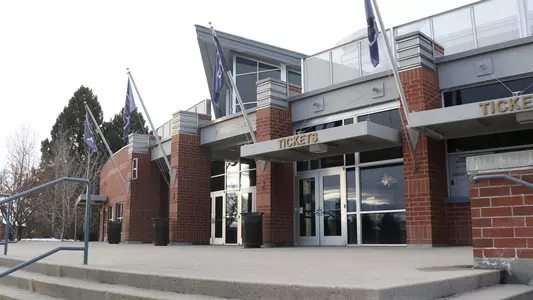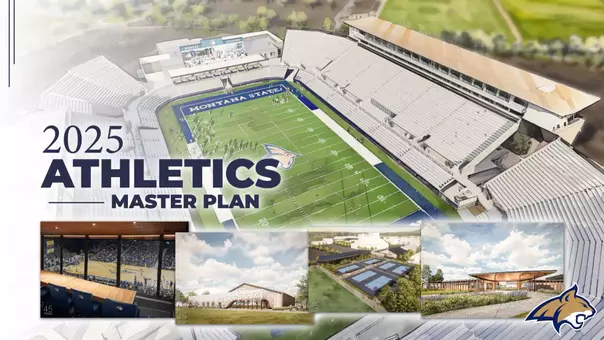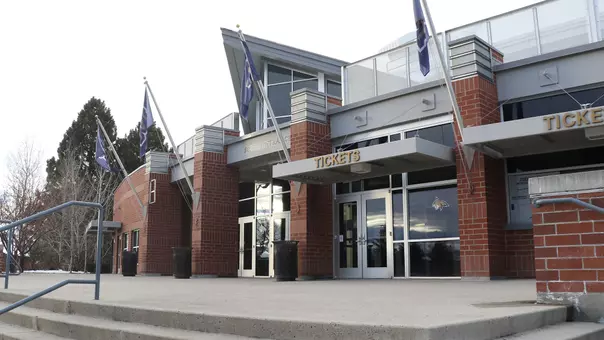
Photo by: Andrew Pedersen
ADAPTING TO THE TIMES: Bobcat Athletics Supports Student-Athletes Through Changing Landscape
4/13/2020 12:22:00 PM | General
Technology helps MSU student-athletes adjust in remote learning environment
BOZEMAN, Montana – Among the many lessons Leon Costello has learned in the month since the day-to-day business of running a Division I athletic department veered drastically off course, one stands out.
"Even as one of the older members of our athletic department," Montana State's Director of Athletics quips, "I've learned that technology can be our friend. It doesn't always happen right away, but if you embrace all the different things that are available it can make a big impact."
As he nears the fourth anniversary of his appointment to lead Bobcat Athletics in early May, Costello and his peers across the nation navigate a situation without precedent. But even with athletics administrators, coaches and staff members working to support student-athletes adapting to a remote learning environment separated from their teams and built-in support system, Costello says the most important concept remains the same.
"We're spending a lot of time getting information into (student-athletes') hands, and getting the right information to our student-athletes," Costello said, "is probably more important now than ever before because we don't see them every day. We know student-athletes absorb information in a lot of different ways. We usually communicate by email, but there are many different social media platforms, a lot of different methods the students use to get information."
Costello said it isn't a one-size-fits-all proposition. "We're relying on coaches for help. We email information from the University or the Big Sky Conference, then ask the coaches to let the student-athletes know to check their email for whatever it is that we sent. The coaches do a great job of connecting with the student-athletes and each program has their unique communication strategy, and they're continuing that. We also get feedback from the student-athletes through a variety of channels, including the athletic training and academic services areas."
While conveying information during such an unusual time is important, Costello said the Department's "top priority is maintaining the safety and wellness of our student-athletes while supporting their continued development. That will never change." To that end, Costello said the task of maintaining regular contact lies not only with coaches but resides in the support areas that regularly help navigate the rigors of life of Division I athletics.
Aaron Grusonik, PsyD., helps bridge whatever distance may exist between Bobcat Athletics' different support areas as its Director of Student-Athlete Wellness, a position created just one year ago. After a decade at MSU, rising from a role in the school's Counseling Center to Associate Dean of Students, he made the move to Bobcat Athletics. Familiarity eased his transition.
"They're pretty similar, actually," he said of his role in the Dean of Students office and that in Athletics, although in his previous role he initiated most interactions based on notifications from a third party about students struggling. "Right now I'm still doing the same kind of reaching out when we're worried about an athlete, but my focus here in Athletics is much more on sports performance and that kind of wellness so I do have quite a few meetings with students based on their athletic performance or wanting to improve themselves in their sport from a mental health standpoint."
The normal pattern of life for Bobcat student-athletes – dedicating most school-year time to academics and team-related activities – was turned upside down, of course, in a matter of days. MSU's basketball and ski teams had the rug of championship competitions pulled right out from beneath them in mid-March, and every member of a winter or spring season squad was affected in some way, with the announcements cancelling first individual events and the entire spring sports seasons. That precipitated MSU most colleges nationally transitioning to remote class delivery for the remainder of the semester.
That shared universal upheaval, Costello said, brought out the best in MSU student-athletes and the staff supporting them. "I'm very proud of the way our people have met this challenge," he said. "We've all adapted to the technology that's available, we've utilized different communication formats to help our student-athletes, and each other, through this. And through all the changes our student-athletes have been great."
The most time-critical piece, Costello indicated, was adapting to a changing learning environment. That task fell to the Athletic Academic Services area. Associate Athletics Director for Academic Services Jamie Rizzuto and her staff, learning specialist Sierra Fredricksen and student affairs coordinator Emily Keller, have aided student-athletes with issues ranging from transitioning to remote learning and tutoring to registering for Fall 2020 classes.
Rizzuto said patterns have emerged in the issues facing student-athletes. "The time management piece has been an adjustment," said Rizzuto, a former Division I student-athlete with coaching experience. "Our student-athletes are used to being so structured, and their sport dictates that structure. Whenever practice is set, whenever class is set, and the rest of the time is for work or to have free time. When they're lacking that practice time and they're lacking the class schedule they're also lacking the time management piece."
Some students adapt to remote learning more readily than others, Rizzuto said. "Transitioning on-line is harder for some than others because it takes so much self-motivation, so we're working with those student-athletes a little more closely and helping them through things. I think one of the really cool things is the ability to share (computer) screens through Zoom and (Microsoft) Teams to see what the student is looking at. I've Facetimed quite a few of my football student-athletes just to see what they're looking at on their screens as we navigate registration and all those different things."
Grusonik, like Rizzuto a former Division I student-athlete with coaching experience, said helping restore structure to student-athletes' lives has been an important component of his work in the last month. "Universally I've seen that the sleeping patterns and the awake patterns are very skewed right now for almost all of the students, staying up super late, sleeping in super late, and the schedules that their teams in Athletics and their instructors have helped them keep are falling to the wayside quite a bit. I think that sleep hygiene is a huge factor right now."
The cancellation of spring practices and competitions have alleviated the demands on MSU's Athletic Training and Sports Medicine staffs, although regular maintenance continues. "Normally one of us is in the Athletic Training Room five days a week, 8 am to 5 pm, and basically right now we're not there at all," said Dr. Jeff Rasch of MSU's Bozeman Health Sports Medicine Team. "If an athlete's having problems the question becomes, 'What's going on, do we send them to the hospital or an urgent care, or do we meet them in the training room to evaluate them in person?'" Rasch said MSU's Athletic Training staff, led by Rob Higgs, makes the initial evaluation in those instances.
With the end of the semester less than one month away, the focus is firmly on finishing strong academically. Rizzuto said the University's helpfulness dealing with a difficult situation is appreciated. "The word I keep coming back to is grace," she said, specifically citing a change in grading policy that allows students to transform a letter grade to the pass/fail option within five days of the semester's end. "This is something new, but everyone is offering a little more grace and flexibility and I think we'll be able to work through all of this."
Costello maintains confidence that the challenges Bobcat Athletics has met this spring will strengthen the entire department when normalcy returns. "The old saying that tough times don't last but tough people do really applies here," he said. "This pandemic affects people across the world, but the ability to deal with it in a very personal way, helping each other through it, gives us valuable strength that we'll always be able to rely on."
#GoCatsGo
"Even as one of the older members of our athletic department," Montana State's Director of Athletics quips, "I've learned that technology can be our friend. It doesn't always happen right away, but if you embrace all the different things that are available it can make a big impact."
As he nears the fourth anniversary of his appointment to lead Bobcat Athletics in early May, Costello and his peers across the nation navigate a situation without precedent. But even with athletics administrators, coaches and staff members working to support student-athletes adapting to a remote learning environment separated from their teams and built-in support system, Costello says the most important concept remains the same.
"We're spending a lot of time getting information into (student-athletes') hands, and getting the right information to our student-athletes," Costello said, "is probably more important now than ever before because we don't see them every day. We know student-athletes absorb information in a lot of different ways. We usually communicate by email, but there are many different social media platforms, a lot of different methods the students use to get information."
Costello said it isn't a one-size-fits-all proposition. "We're relying on coaches for help. We email information from the University or the Big Sky Conference, then ask the coaches to let the student-athletes know to check their email for whatever it is that we sent. The coaches do a great job of connecting with the student-athletes and each program has their unique communication strategy, and they're continuing that. We also get feedback from the student-athletes through a variety of channels, including the athletic training and academic services areas."
While conveying information during such an unusual time is important, Costello said the Department's "top priority is maintaining the safety and wellness of our student-athletes while supporting their continued development. That will never change." To that end, Costello said the task of maintaining regular contact lies not only with coaches but resides in the support areas that regularly help navigate the rigors of life of Division I athletics.
Aaron Grusonik, PsyD., helps bridge whatever distance may exist between Bobcat Athletics' different support areas as its Director of Student-Athlete Wellness, a position created just one year ago. After a decade at MSU, rising from a role in the school's Counseling Center to Associate Dean of Students, he made the move to Bobcat Athletics. Familiarity eased his transition.
"They're pretty similar, actually," he said of his role in the Dean of Students office and that in Athletics, although in his previous role he initiated most interactions based on notifications from a third party about students struggling. "Right now I'm still doing the same kind of reaching out when we're worried about an athlete, but my focus here in Athletics is much more on sports performance and that kind of wellness so I do have quite a few meetings with students based on their athletic performance or wanting to improve themselves in their sport from a mental health standpoint."
The normal pattern of life for Bobcat student-athletes – dedicating most school-year time to academics and team-related activities – was turned upside down, of course, in a matter of days. MSU's basketball and ski teams had the rug of championship competitions pulled right out from beneath them in mid-March, and every member of a winter or spring season squad was affected in some way, with the announcements cancelling first individual events and the entire spring sports seasons. That precipitated MSU most colleges nationally transitioning to remote class delivery for the remainder of the semester.
That shared universal upheaval, Costello said, brought out the best in MSU student-athletes and the staff supporting them. "I'm very proud of the way our people have met this challenge," he said. "We've all adapted to the technology that's available, we've utilized different communication formats to help our student-athletes, and each other, through this. And through all the changes our student-athletes have been great."
The most time-critical piece, Costello indicated, was adapting to a changing learning environment. That task fell to the Athletic Academic Services area. Associate Athletics Director for Academic Services Jamie Rizzuto and her staff, learning specialist Sierra Fredricksen and student affairs coordinator Emily Keller, have aided student-athletes with issues ranging from transitioning to remote learning and tutoring to registering for Fall 2020 classes.
Rizzuto said patterns have emerged in the issues facing student-athletes. "The time management piece has been an adjustment," said Rizzuto, a former Division I student-athlete with coaching experience. "Our student-athletes are used to being so structured, and their sport dictates that structure. Whenever practice is set, whenever class is set, and the rest of the time is for work or to have free time. When they're lacking that practice time and they're lacking the class schedule they're also lacking the time management piece."
Some students adapt to remote learning more readily than others, Rizzuto said. "Transitioning on-line is harder for some than others because it takes so much self-motivation, so we're working with those student-athletes a little more closely and helping them through things. I think one of the really cool things is the ability to share (computer) screens through Zoom and (Microsoft) Teams to see what the student is looking at. I've Facetimed quite a few of my football student-athletes just to see what they're looking at on their screens as we navigate registration and all those different things."
Grusonik, like Rizzuto a former Division I student-athlete with coaching experience, said helping restore structure to student-athletes' lives has been an important component of his work in the last month. "Universally I've seen that the sleeping patterns and the awake patterns are very skewed right now for almost all of the students, staying up super late, sleeping in super late, and the schedules that their teams in Athletics and their instructors have helped them keep are falling to the wayside quite a bit. I think that sleep hygiene is a huge factor right now."
The cancellation of spring practices and competitions have alleviated the demands on MSU's Athletic Training and Sports Medicine staffs, although regular maintenance continues. "Normally one of us is in the Athletic Training Room five days a week, 8 am to 5 pm, and basically right now we're not there at all," said Dr. Jeff Rasch of MSU's Bozeman Health Sports Medicine Team. "If an athlete's having problems the question becomes, 'What's going on, do we send them to the hospital or an urgent care, or do we meet them in the training room to evaluate them in person?'" Rasch said MSU's Athletic Training staff, led by Rob Higgs, makes the initial evaluation in those instances.
With the end of the semester less than one month away, the focus is firmly on finishing strong academically. Rizzuto said the University's helpfulness dealing with a difficult situation is appreciated. "The word I keep coming back to is grace," she said, specifically citing a change in grading policy that allows students to transform a letter grade to the pass/fail option within five days of the semester's end. "This is something new, but everyone is offering a little more grace and flexibility and I think we'll be able to work through all of this."
Costello maintains confidence that the challenges Bobcat Athletics has met this spring will strengthen the entire department when normalcy returns. "The old saying that tough times don't last but tough people do really applies here," he said. "This pandemic affects people across the world, but the ability to deal with it in a very personal way, helping each other through it, gives us valuable strength that we'll always be able to rely on."
#GoCatsGo
Leon Blue and Gold Gala Tickets
Friday, September 05
Leon Costello Press Conference: Kennedy-Stark Athletic Center
Thursday, July 31
A Conversation with President Dr. Waded Cruzado | Montana State Athletics
Monday, May 19
Big Cats, Little Trucks - Willie Patterson
Wednesday, May 03



















